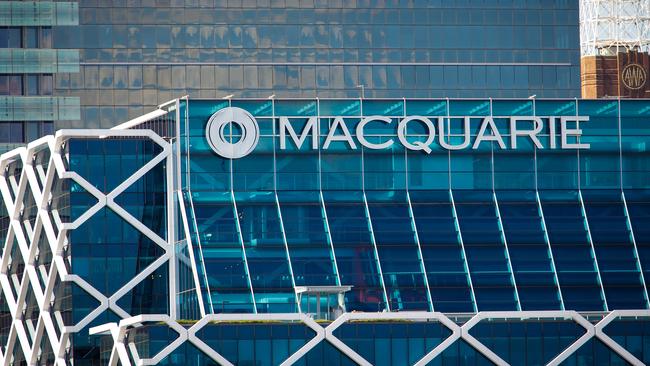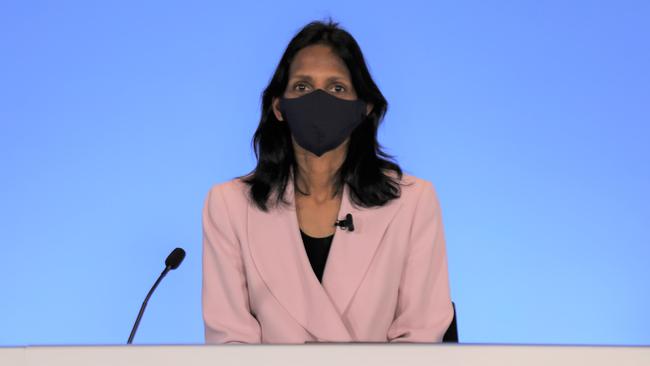Macquarie warns of ‘long’ lockdowns without vaccines
But the investment banking giant expects much of the population to be vaccinated by the end of the year.

Australia is at risk of several more months of lockdowns due to low vaccination rates, Macquarie Group has warned.
But the investment banking giant is hopeful the nation can hasten its vaccination rollout and expects much of the population to be vaccinated by the end of the year.
Speaking on the sidelines of Macquarie’s annual meeting on Thursday, chief executive Shemara Wikramanayake revealed a still-cautious stance on the near-term economic outlook, with Macquarie closely watching the government’s next fiscal stimulus steps.
Ms Wikramanayake and Macquarie chairman Peter Warne were also forced to defend the company’s role in the disastrous Nuix float, telling shareholders the bank’s own review found it had followed its “usual rigorous standards” in its handling of the IPO.
“The challenge for us in Australia is that our vaccination rate is low, and we’re seeing in places like the UK where there’s a higher vaccination rate and the Delta variant is right there, that they are actually able to treat it more like a flu”.
“Until we get some much greater vaccination rates, we will have to work with potential lockdowns,” she warned.
“Having said that, our view is that we should have sufficient vaccinations by the end of this calendar year for the Australian population, assuming people are accepting and adopting the vaccination at the rate that‘s been happening around the world, and to have a big proportion of the population vaccinated.”
Her comments were echoed by National Australia Bank chief executive Ross McEwan who told a separate forum in Melbourne that there was a willingness to get 80 per cent of the population vaccinated.
“Let’s target the 80 per cent who do want to get the job done and get the vaccination into their arms,” he told radio 3AW. “Then work on the 10 per cent who can be swung across (and) then let’s open this economy up because everybody’s had a chance”.

While Macquarie sees the potential for “several more months” of lockdowns, a big factor in the economic impact would be the stimulus packages from the government stepping up, Ms Wikramanayake said.
“They’ve done a very good job protecting the economy through this and something that’s very interesting is compared to the previous financial crisis, the bounce back from the Covid pandemic has been very fast all around the world.
“Particularly here in Australia we saw growth come back very quickly and employment, not just come back quickly, but end up ahead of where it was before the pandemic.
“So, our view is that these implications could be short term, but maybe for Australia, another quarter, say, of impact, and we need to monitor in terms of our provisioning, what happens as we come out of it and what sort of steps the government takes with stimulus.”
Macquarie CFO Alex Harvey pointed to the improving economic outlook around the globe as a consequence of substantial fiscal stimulus measures, with the company waiting to see what happens once that stimulus is removed.
“One of the challenges is we’re seeing a pick-up in Covid-19 infections around the world and so that’s yet to play out. We have a pretty diverse business so we’re looking at what’s going on in Europe, the US and what’s going on in Australia.
“Each of the economies are at a different stage and as we go through the rest of this half and into the rest of the year we’ll have to see how that looks from an overall viewpoint,” he said.
Macquarie is strongly encouraging staff to get vaccinated, according to Ms Wikramanayake, but is not yet making the jabs mandatory.
“We will align with government guidance in each location but tailor also very much to each workplace and each business line and what are the relevant considerations, both from the government’s point of view and how do we deliver value to our clients.”
Facing questions from disgruntled shareholders over the Nuix IPO, for which it was the former majority shareholder and float manager for the December 2020 listing, Ms Wikramanayake defended Macquarie’s standards and said at the time of the float there was no reason to believe Nuix forecasts would not be met.
Macquarie was a joint lead manager on the initial public offering, alongside Morgan Stanley. It held a 70 per cent shareholding in Nuix, which it sold down to 30 per cent as part of the float.
“We had a separate team undertake the due diligence to the team that worked on the investment and we operated to our usual very rigorous standard as we do in all our equity capital markets,” she said.
The prospectus put out was “robust”, she added.
“At the time none of us had any reason to believe that the prospectus forecasts at the time of float would not be met. We remain confident in the medium-term prospects of this high-quality business and product.”
Nuix shares are currently trading at around $2.50, 70 per cent lower than the $8 per share it hit on its first day of trade in early December. Since then it has shocked the market with missed earnings forecasts and allegations of insider trading.
Macquarie on Thursday informed shareholders it would slash its dividend payout range in order to pump capital into growing its business.
The group will now target a payout of between 50 and 70 per cent of net profit “in order to allow additional flexibility to support business growth”. The new range is down from the previous target of between 60 and 80 per cent.
“It really reflects the opportunities available,” Macquarie chairman Peter Warne said.
“We have deployed $3.8bn of capital over the last nine months and, given our outlook, we see further opportunities over coming months. So it really is a reflection of the opportunities we see and the flexibility that reducing the payout ratio will provide.”
The group ended the 2021 financial year with $8.8bn of surplus capital. This dropped to $7.4bn by the end of the first half, still a comfortable surplus over the APRA minimum, Macquarie CEO Shemara Wikramanayake said.
“The biggest absorption of capital was in the businesses. They absorbed $1.5bn of capital (in the first quarter). If we go back over the second six months of last year, so a nine-month period in total, the businesses absorbed $3.8bn (of capital).
“That happened across all four operating groups, where they’re finding good opportunities to invest in this environment,” she said.
Ms Wikramanayake in late 2020 reaffirmed Macquarie’s acquisitive stance, saying it was seeking to capitalise on the Covid-19 market disruption and was actively looking for opportunities to deploy its multi-billion dollar war chest.
In December it announced the $US1.7bn ($2.3bn) acquisition of Kansas City-based asset and wealth manager Waddell & Reed, which completed at the end of April. In July, it announced the acquisition of AMP Capital’s Global Equity and Fixed Income business.
Alongside both Waddell and AMP, its banking business was seeing growth in the loan book, while in commodities and global markets Macquarie was “able to step up and service clients through volatile markets”.
“Lastly, Macquarie Capital, (we see) a good opportunity for investing as well as realising in activity,” Ms Wikramanayake said.
Growth in the home loan book and business banking book was “strong”, she said, as she reassured investors that these segments were “growing very conservatively in low loan-to-value ratio segments”.
“We haven’t seen yet the requests for payment pause and hardship assistance to the level of the first round of the pandemic. I guess people have learned to live with this a little bit more.”
Macquarie shares rose 0.3 per cent to close the session at $157.13.








To join the conversation, please log in. Don't have an account? Register
Join the conversation, you are commenting as Logout